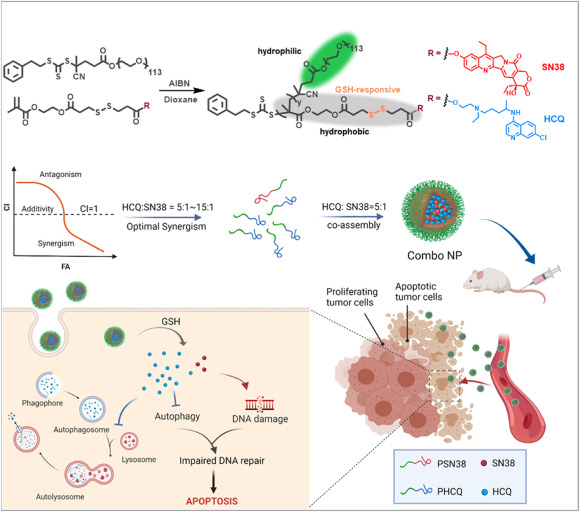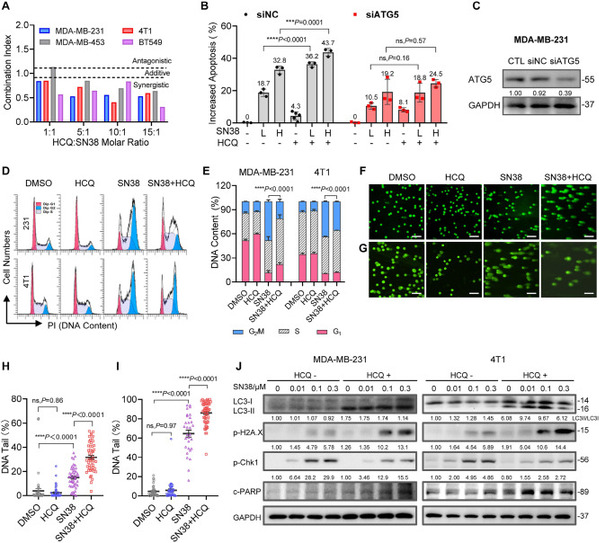Effective combination therapies are urgently needed to treat triple-negative breast cancer (TNBC), which is insensitive to the existing treatment regimens. However, the synergistic potency of traditional small-molecule combinations is limited mainly due to mismatched molar ratios, inconsistent pharmacokinetics, and intratumoral accumulation of individual drugs. Current nanotechnology offers an unparalleled development on advanced combination drug delivery, especially ratiometric drug delivery in vivo.
Recently, Prof. LIU Xiangrui and Prof. ZHOU Tianhua from the Zhejiang University School of Medicine co-published an article entitled "Nanoprodrug ratiometrically integrating autophagy inhibitor and genotoxic agent for treatment of triple-negative breast cancer" in Biomaterials. This study reports a glutathione-responsive self-assembled Combo NP ratiometrically co-delivering hydroxychloroquine (HCQ) and 7-ethyl-10-hydroxycamptothecin (SN38) for synergistic therapy of metastatic TNBC (Figure 1).

Figure 1. Schematic illustration of Combo NP ratiometrically integrating HCQ and SN38.
In April 2020, a SN38-based antibody-drug conjugate (Sacituzumab Govitecan) was approved by FDA for the treatment of metastatic TNBC patients. SN38 is a potent topoisomerase I (TOP1) inhibitor, which induces DNA single- or double-strand breaks during DNA replication. Growing evidence suggests that autophagy ("self-eating") plays important roles in maintaining genomic stability and regulating the DNA repair. The study found that the autophagy inhibitor HCQ enhanced tumor cell responsed to SN38 through impairing DNA damage repair, and obtained the range of synergistic HCQ/SN38 molar ratios in TNBC cells (Figure 2).

Figure 2. Autophagy inhibitor HCQ sensitizes tumor cells to the genotoxic effect of SN38
To further elevate the synergictic effect, they developed a nanoprodrug strategy for implementing the ratiometric combination of SN38 and HCQ. SN38 or HCQ was linked to an amphiphilic polymer through a disulfide bond, which will be specifically cleavable under endogenous high levels of GSH in tumor cells to release parent drugs, thus avoiding indiscriminate release in normal tissues. The two polymeric prodrugs were ratiometrically co-assembled into nanoparticles Combo NP at the optimized synergistic molar ratio. The Combo NP not only significantly improves the pharmacokinetics and tumor distribution of both drugs, but also achieves the designed ratiometric delivery, resulting in superior antitumor activity versus the free drug combination regimen in metastatic TNBC mice.
This study focuses on the rationale and synergistic mechanisms investigation of a genotoxic agent SN38 and an autophagy inhibitor HCQ, in parallel, provides a polymeric prodrug-based co-delivery paradigm to overcome the drawbacks of traditional small-molecule drug combinations, thereby yielding enhanced anti-tumor potency for TBNC treatment.
Source: School of Medicine, Zhejiang University






